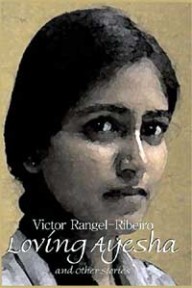 Victor Rangel-Ribeiro’s Loving Ayesha and Other Stories (Harper Collins India) is a collection that first appeared in 2003, but apart from a couple of stories, that have appeared in magazines, I read this entire collection only just now and this late discovery is a matter of regret as also thrill.
Victor Rangel-Ribeiro’s Loving Ayesha and Other Stories (Harper Collins India) is a collection that first appeared in 2003, but apart from a couple of stories, that have appeared in magazines, I read this entire collection only just now and this late discovery is a matter of regret as also thrill.
It was the title story, Loving Ayesha I read first. I did this because something about the cover picture made me assume it was Ayesha. But more on this story later. Most of the stories in this collection have this charming and elfin quality; they contain a puckish humour and are all so varied, employing different narrator voices that they make nice reading too.
As a contrast, I could cite, An Anna’s Worth of Kindness and the equally long titled, How I Missed My Chance To Be a Real Porno Star – these are told in a lively, hapless youthful voice though they are set in two different cities of the world. And then there is the story of an elderly Indian woman befriending her equally old Chinese neighbour though they do not know each other’s language.
I loved Moon Dance for the poignant, gentle way it described a changing way of life – the image of a passing motorcar choking the carriage in dust was so evocative; and the child’s attempts at keeping his parents’ good humour intact was moving. Pieces like An Anna’s Worth of Kindness, Night Encounter, are Bombay youth tales, showing us a vignette of its life – a tramcar ride, a chance encounter with a prostitute.
Lazarus as the good-hearted, lovable thief in The Miscreant is especially endearing. It is such a lovely Goa story and such a pleasure to read. This story later went on to become part of the award winning novel, Tivolem that appeared in 1999 (Milkweed Editions, US).
Peter and the Ants ended on quite a macabre, surreal note, but I enjoyed the slow, certain build up; the narrators in both Uncle Prabhu’s Y2K party and Reaching Out have this unworldly, absent-minded manner about them, as they deal with bossy aunts/wives. And one can almost sympathise with the jaded older writer in Specials of the Day as you realise how he is manipulated for all his best efforts to retain control.
But Loving Ayesha takes in so much more – it is Goa’s story and the story of an idealistic young man hoping to find (and hold on to) love and his place in the world.
I read this soon after moving cities and countries, and the wisdom that characters such as Ayesha’s father and Father Burgoyne show, the gentle, sad (even inevitable) way the story unfolds, the nobility every character displays, was very moving. After I read the three principles Father Burgoyne imparts to the narrator; the grace with which Moira and Ayesha make their choices, the sad appeal of her mother and how the narrator lives with his lost love, even after he has left for the US, I felt that things like leaving a familiar place, or even for example, losing love were bearable. That loss too can be enriching, in a way. I related to it in a more personal way – as readers do with books and stories they especially like.
What make the book especially charming are Mario Miranda’s illustrations in the book, done in his distinctly inimitable style. Victor Rangel-Ribeiro is now based in New York but he visits Goa every year, and remains a mentor to younger writers. Having spent his early years in Goa, then a Portuguese colony, he moved to Bombay where he studied at St. Xaviers. He worked in some leading newspapers such as the Indian Express and Times of India and also in an ad agency, J Walter Thompson, a British owned firm where he was the first Indian to be a copy-chief.
He left for the US in 1956, where among other things, he wrote a column on classical music for The New York Times, wrote books on the subject too, and also taught at an alternative school in Harlem. Indeed, a man of many parts, and a writer who deserves to be widely read.
Anu Kumar’s latest book is The Dollmaker’s Island. (http://www.flipkart.com/dollmakers-island-anu-kumar-book-8190939130) More about her on Story Wallahs.





